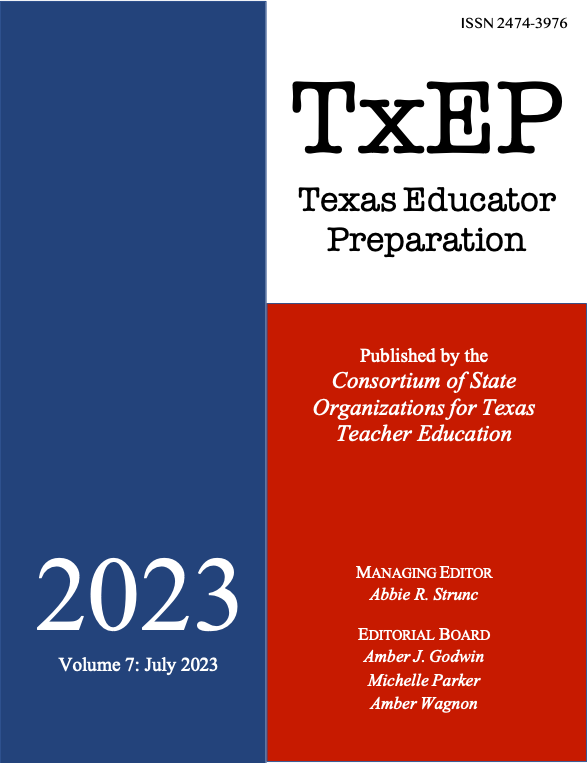Teacher Preparation Matters
Long-Term Outcomes Outpacing Teacher Retention and Career Trends through a Year-long Teacher Residency Design
DOI:
https://doi.org/10.59719/txep.v7i1.2Keywords:
first-day ready, self-efficacy in first year, teacher preparation program, teacher retention, year-long residency.Abstract
The current mixed-methods study investigated retention rates of teachers who participated in a year-long residency preparation program on a single campus with a population reflecting 94% low-socioeconomic and 88% minority students. Participants had 9 to 17 years of experience in the profession. Quantitative data showed a statistical difference when comparing state data with the year-long internship retention rates over the initial five years. Findings from surveys and interviews with high-achieving interns showed that a year-long residency best prepares teachers to be day-one ready and supports longevity in the career.
Downloads
References
Bandura, A. (1977). Self-efficacy: Toward a unifying theory of behavioral change. Psychological Review, 84(2), 191–215. https://doi.org/10.1037/0033-295X.84.2.191
Bandura, A. (1997). Self-efficacy: The exercise of control. W. H. Freeman and Company.
Bandura A. (2001). Social cognitive theory: An agentic perspective. Annual review of psychology, 52, 1–26. https://doi.org/10.1146/annurev.psych.52.1.1
Charles Butt Foundation (2021). How Texas teachers experience pandemic challenges: The 2021 poll on teachers' attitudes toward public education. https://charlesbuttfdn.org/wp-content/uploads/2022/01/2021_How-Texas-Teachers-Experience-Pandemic-Challenges.pdf
Clark, S. K., & Andreasen, L. (2021). Exploring elementary teacher self-efficacy and teacher beliefs: are we preparing teachers to teach culturally diverse students? Asia-Pacific Journal of Teacher Education, 49(1), 128–142. https://doi.org/10.1080/1359866X.2020.1777528
Corty, E. W. (2016). Using and interpreting statistics: A practical text for the behavioral, social, and health sciences. (3rd Ed.). Worth Publishers.
Davis, T. R., Bolyard, C. S., Zhang, S., Livers, S. D., Sydnor, J., & Daley, S. (2019). A multiteacher preparation program study of elementary teacher candidate’s self-efficacy: Analysis of participant characteristics and implications for teacher educators. The Teacher Educator, 54(3), 313-330.
Dennis, D. V. (2016, April). A teacher residency melds classroom theory with clinical practice. Phi Delta Kappan, 97(7), 14-18.
Goldhaber, D., & Cowan, J. (2014). Excavating the teacher pipeline: Teacher preparation programs and teacher attrition. Journal of Teacher Education, 65(5), 449-462, https://link.gale.com/apps/doc/A404590298/AONE?u=nysl_oweb&sid=bookmark-AONE&xid=aa3af921
Green, G. & Ballard, G. H. (2011). No substitute for experience: Transforming teacher preparation with experiential learning practices. SRATE 20(1), 12-20.
Guha, R., Hyler, M. E., & Darling-Hammond, L. (2016, September). The teacher residency model: An innovative model for preparing teachers. Learning Policy Institute. https://learningpolicyinstitute.org/sites/default/files/product-files/Teacher_Residency_Innovative_Model_Preparing_Teachers_REPORT.pdf
Guha, R., Hyler, M. E., & Darling-Hammond, L. (2017a, May). The power and potential of teacher residencies. Phi Delta Kappan, 98(8).
Guha, R., Hyler, M. E., & Darling-Hammond, L. (2017b, Spring). The teacher residency: A practical path to recruitment and retention. American Educator, 41(1), 31-34.
Hargus, J., Ballard, G., & Author (2010). A “medical model” professional development school: A partnership for teacher education. Proceedings of the World Federation of Associations for Teacher Education First Biannual Conference, Chicago, IL.
Hinton-Crawford, B. N. (2020). Improvement science in education: A primer. Myers Education Press.
Holmes Group (1995). Tomorrow’s schools of education: A report of the Holmes group. The Holmes Group.
Ingersoll, R. M., Merrill, E., Stuckey, D., Collins, G. (2018). Seven trends: The transformation of the teaching force-updated October 2018. Consortium for Policy Research in Education. https://repository.upenn.edu/cpre_researchreports/108/
Ingersoll, R. M., & Strong, M. (2011). The Impact of Induction and Mentoring Programs for Beginning Teachers: A Critical Review of the Research. Review of Educational Research, 81(2), 201–233. http://www.jstor.org/stable/23014368
Mohamed, Z., Valcke, M., & De Wever, B. (2016). Are they ready to teach? Student teachers’ readiness for the job with reference to teacher competence frameworks. Journal of Education for Teacher, 43(2) 151-170.
Narayan, R., Rodriguez, C., Araujo, J., Shaqlaih, A., & Moss, G. (2013). Constructivism – Constructivist learning theory. In B. J. Irby, G. Brown, R. Lara-Alecio, & S. Jackson (Eds.), The handbook of educational theories (pp. 169–183). IAP Information Age Publishing.
Paciotti, K. D.(2013). Cognitivism: Ways of knowing. In B. J. Irby, G. Brown, R. Lara-Alecio, & S. Jackson (Eds.), The handbook of educational theories (pp. 105–113). IAP Information Age Publishing.
Piaget, J. (1977). The development of thought: Equilibration of cognitive structures. (Trans A. Rosin). Viking.
Author (2013). A medical-model professional development school: Effects of training experience on the first year of teaching (Doctoral dissertation). Ann Arbor, MI: ProQuest. (UMI No. 3562548)
Reeves, D. (2018). Seven keys to restoring the teacher pipeline. Educational Leadership, 75(8).
Silva, T., McKie, A., & Gleason, P. (2015, August). New findings on the retention of novice teachers from teaching residency programs. NCEE Evaluation Brief. NCEE 2015-4015. National Center for Education Evaluation and Regional Assistance.
Templeton, T., Lowrey, S., Horn, C. L., Alghazzawi, D., & Bui, B. (2020). Assessing the effectiveness of Texas educator preparation programs. University of Houston, College of Education.
Texas AFT (2022, February). The Crisis in Our Schools What’s needed to support employees and students. https://www.texasaft.org/wp-content/uploads/2022/02/22.02.03.TexasAFTSurveyReport.pdf
Texas Education Agency (n.d.). Employment of Initially Certified Teachers 2016-17 through 2021-22. Retrieved July 25, 2022, from https://tea.texas.gov/sites/default/files/employment-of-initially-certified-teachers-2022.pdf
Tschannen-Moran, M., & Hoy, A. (2001). Teacher efficacy: Capturing an elusive construct. Teaching and Teacher Education, 17(7), 783-805.
Van Overschelde, J.P. & Wiggins, A.Y. (2020) Teacher preparation pathways: Differences in program selection and teacher retention. Action in Teacher Education, 42(4), 311-327, DOI: 10.1080/01626620.2019.1656116
Zhang, G., & Zeller, N. (2016, Spring). A longitudinal investigation of the relationship between teacher preparation and teacher retention. Teacher Education Quarterly, 43(2), 73-92.





